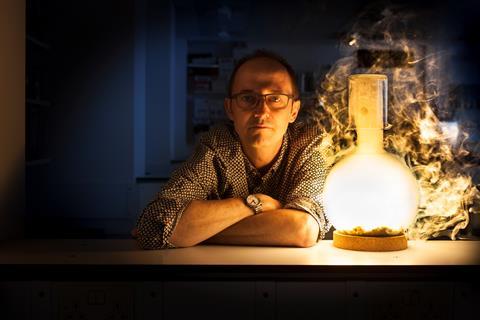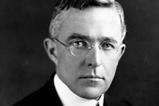Andrea Sella explains how inaction over Elon Musk’s membership motivated him to act

There’s an old phrase: what happens in Vegas, stays in Vegas. This phrase has been in my head for months with every ideological lurch in US government policy. The implications for science, but even more importantly for the health and wellbeing of people across the world, have been stark.
These events force me to ask what I have done with my life? What have I tried to achieve through public engagement? And at what point does sci-comm need to turn into something more than talk and play? Such thoughts led me to return the biggest accolade of my career, the Royal Society’s Michael Faraday prize.
As a graduate student and young lecturer I thought my role was to show people chemistry; to share the joy of being a tour guide to the subject I’d fallen in love with. I blew up balloons with delight; I made things stink and change colour with enthusiasm. It was after one of these lectures that a retired colleague of mine quietly remarked that it was all rather wonderful, but that ‘it didn’t have much of a theme’.
It struck home. Was I really doing the right thing with the flashes and bangs? Was I just cherry-picking the highlights and failing to convey the deeper meaning of chemistry? Was I was trivialising our intellectual journey? I began to look for longer stories to tell, trying to deconstruct chemical processes, finding ways to put them in context.
Responsible communication
I guess I must have done something right because to my astonishment I was awarded the Royal Society’s Faraday prize – think David Attenborough, Richard Dawkins, Brian Cox – for science communication in 2014. In my prize lecture, I expressed many of my misgivings, illustrating my arguments with both chemistry from the literature and a few favourite demonstrations. By the time of the party after the talk, I was walking on air.
Yet the sense of responsibility towards my community and my audiences began to creep up on me, especially when I talked to journalists about endlessly dark chemistry-related news. More and more I felt I had to talk about climate change, industrial safety, chemical weapons, disinformation – questions that few other chemists were talking about in public.
What is science really about?
I needed to get across not just the chemistry, but the thought processes and our drivers. What do we stand for? What is science really about? Is it a fun game to satisfy our intellectual thirst, or is it fundamentally an epistemic quest, a search for truth in a world where knowledge is being drowned by firehoses of opinion and synthetic nonsense?
Some radio programmes I made brought relentless trolling on Twitter and Facebook; it didn’t do my head much good. I left both platforms, especially when checks on content were removed by their owners, not least Elon Musk. The lies and unbridled hate-mongering made me question whether my university, University College London, should even be giving free, quality content to such platforms, let alone actually paying good money to be ‘promoted’.
Silence under threat
The fact that in 2018 Elon Musk had been elected a Fellow of the Royal Society – the organisation that had awarded me the Faraday prize – was incomprehensible. Online, Musk has amplified wild conspiracy theories, repeated racist and eugenic ideas, and spread calls for harming of one of his fellow Royal Society members, Anthony Fauci. The Royal Society stayed silent, declining to take disciplinary action against Musk even after resignations and petitions.
US science is suffering a destruction from within
Acting for the US administration, this past spring Musk embarked on a rampage via the ‘department of government efficiency’, gutting science-based agencies, shutting down scientific databases, shredding public health programmes. Friends have had their offices ransacked by Musk’s people, lost jobs or had grants terminated. US science is suffering a destruction from within.
It was Salim Abdool Karim’s superb Faraday Lecture at the end of May – ‘Science under Threat’ – that forced me to act. The elephant in the room – Elon Musk’s membership of the society – went unmentioned. After sharing my letter to the Royal Society with The Financial Times, I cycled nervously across London to return the medal and the certificate.
Las Vegas… Do things stay in Vegas? Mark my words. It could happen here. Are you ready to make ‘good trouble’?

















No comments yet